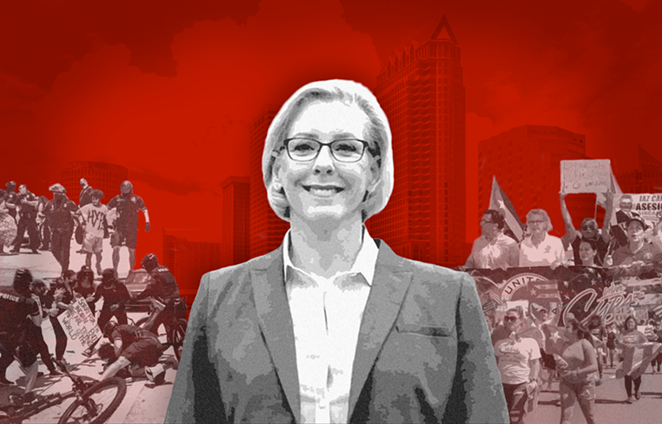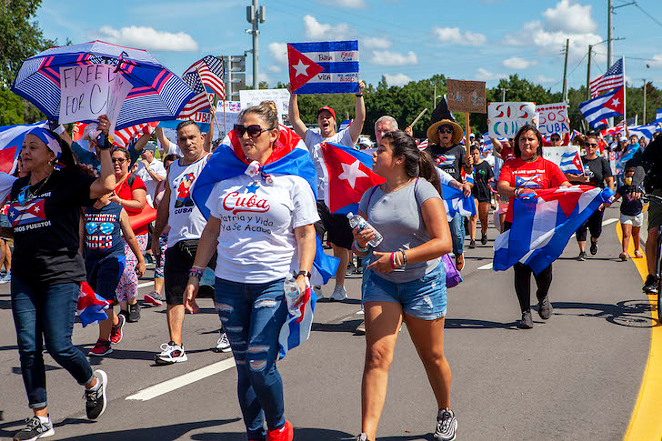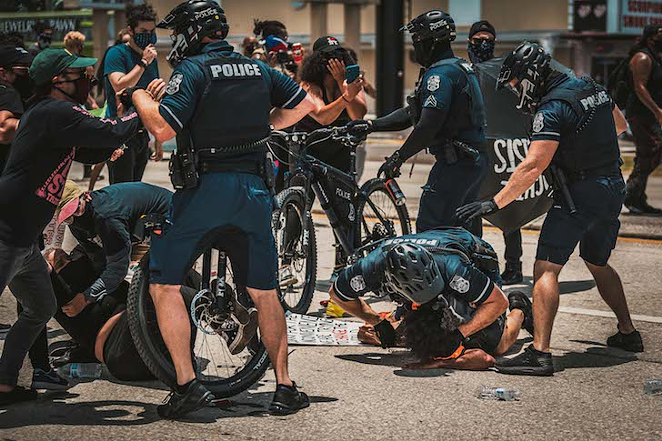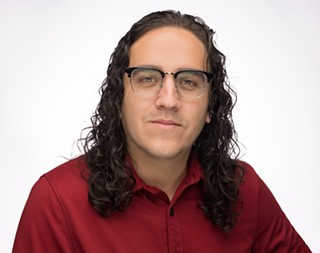Last week, Tampa Mayor Jane Castor publicly supported Cuban protesters in a video and followed that up by attending Saturday’s ‘support Cuba rally’ in West Tampa. This left protesters from the George Floyd uprising wondering why their protests were treated so differently.
“The City of Tampa stands with the people of Cuba in exercising their fundamental right to free speech,” Castor said, joining a bipartisan coalition of politicians across the country in support of the movement.
Many U.S. politicians referenced a lack of vaccines and the poverty they say has taken over the island; they cited the Cuban government’s failures to its people. Miami’s mayor even called for U.S. airstrikes on the island as the solution to their problems, while groups like Black Lives Matter instead called for an end to the generations-long, crippling U.S. embargo on Cuba—which the United Nations has repeatedly and overwhelmingly condemned.
Politicians across the country—from President Biden to Governor Ron DeSantis and Senator Marco Rubio—took the opportunity to appeal to their Cuban constituents, identifying with the struggle in Cuba which has been under communist rule since 1965.
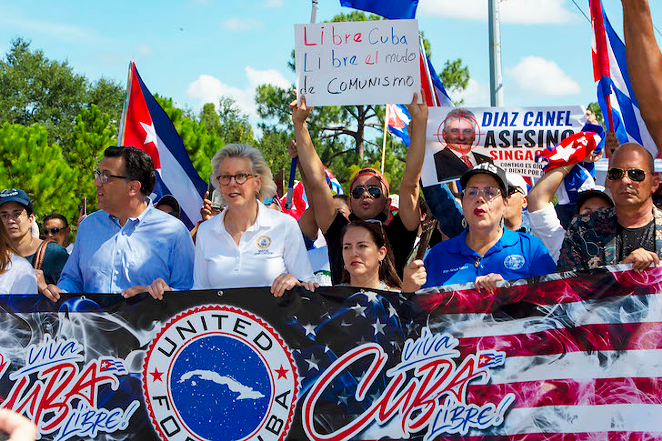
Castor went a step further than some other politicians and helped with Saturday’s rally, which was supported by Tampa Police officers (TPD) who blocked off N Himes Avenue for a march.
"We live in the greatest country in the world and that's what we wish for everyone else," the mayor said at the demonstration.
Like other politicians opposed to the Cuban government—and mainstream media outlets like Fox News, which blurred out certain protest signs that were against imperialism—Castor left the U.S. embargo of Cuba out of her talking points. The U.S. and Israel are the only countries that support the embargo.
Looming over Castor’s remarks, however, was an event that happened just one year prior and about two miles away.
On July 4, 2020, TPD pepper-sprayed and violently arrested BLM protesters marching north on Dale Mabry Highway. That same police force—which Castor led as chief of police from 2009-2015 before becoming mayor in 2019—spent the summer confronting protesters in an aggressive fashion.
In 2020 alone, a veteran was shot in the back of the head with a rubber bullet. Protesters marching peacefully on the street were assaulted, pepper-sprayed, and arrested. A chemical agent in the form of eye irritant was used on demonstrators. Violent drivers who plowed through peaceful protesters were released and not pursued by the police. Activist Jae Passmore was injured during a violent arrest.
While recent pro-Palestine rallies and some large BLM marches—like the one on Bayshore Boulevard—were largely absent of police altercations with protesters, others weren’t.
Those who were standing up for racial justice, dignity, and their lives, told Creative Loafing Tampa Bay that they felt like combatants in a war.
In an interview with CL in May, activist Tatiana Morales referred to the violence as “police war crimes.” When activists presented their concerns to the city, they were “completely and constantly ignored,” she said.
Other activists faced similar repression and said they are appalled by the disparity in treatment that some protesters receive versus others.
“Jane Castor allowed her militarized police force to brutalize protesters in the streets repeatedly last summer, said nothing while the cops let cars drive through protests, and allowed the police to bring felony charges against innocent protesters, that some are still dealing with today,” ErrDaisha J. Floyd—an activist who protested last year—told CL. “She, just like the other U.S. politicians, is a hypocrite.”
CL sent a detailed list of questions to the City of Tampa’s Communications Director Adam Smith to ask if the mayor’s office had a response to the claims that the treatment of BLM protesters was different than the current protests.
“We absolutely support everyone’s right to peacefully assemble, express themselves, and demonstrate,” Smith wrote in an email. “They need to do so without jeopardizing the safety of others.”
Today we marched side by side for the brave people of Cuba.
— Jane Castor (@JaneCastor) July 17, 2021
The fight for freedom is all of our fight. 🇨🇺 pic.twitter.com/bPpsZGpK42
Last week, the Tampa Bay Times reported that Castor said Tampa police treated Cuba protesters with respect and patience during the initial outbreak of protests. Castor went on to say the police treated BLM protesters the same way last summer.
The Times pointed out that plenty of people disagree with this perspective. Castor said those who disagree with her, “never let the facts get in the way of a good story.”
But BLM protesters asking their government to change weren't on the streets getting violently arrested (with some saying they were beat up and groped when they got to Orient Road Jail) so they could tell a good story to their friends. They were on the streets calling for change, just like the Cuba protesters demanding change for their country.
On July 13, anti-Cuban government protesters blocked Dale Mabry Highway for hours before being moved by police. Three of the protesters made a move for the I-275 onramp and two were arrested for assaulting police officers. The other was detained as well.
DeSantis’ new “anti-riot” law penalizes protesters for blocking traffic and other forms of civil disobedience, but most of the Cuba protesters were removed peacefully, with only the three who went for the interstate being arrested, according to police. The arrestees were denied bail due to the anti-riot law.
CL asked the city if Castor ever spoke against DeSantis' law, which the American Civil Liberties Union of Florida (ACLU) condemned, claiming the law suppresses free speech. The city offered no response to the question.
Last year on the Fourth of July—before DeSantis’ law was passed—BLM protesters were marching on Dale Mabry Highway. Police claimed that protesters were a threat and had to intervene, this led to a clash and multiple arrests.
Days later, a video was released showing the police instigating violence against the protesters, aggressively arresting and macing them. According to local lawyers and activists, the charges that were waged by the city stand, and three of the activists still face jail time if they are convicted.
Despite what occurred in 2020, activists are still demonstrating against TPD. This year, the city has explored creating a new city center, with a new TPD headquarters across the street. Local activists demonstrated against the new HQ plan earlier this month.
TPD bodycam footage below (fast forward to the 6:15 mark) shows July 4th protester who asked "Why are we being arrested?" being slammed to the ground by an officer.
“More of the city’s money should be going to the community through a budget based around the people’s needs, not the police!” The flyer for the protest reads.
They’re part of the same activist community that last year called into question a government using funds for police that they think could be put to more useful means.
Activist demands for the already robust police budget to be directed toward healthcare, education, and infrastructure were met instead with the largest police budget increase in any major U.S. city. Meanwhile, other major cities like Los Angeles heard activists' calls. Millions of dollars are being diverted from policing to students, community programs, homeless outreach, and environmental initiatives.
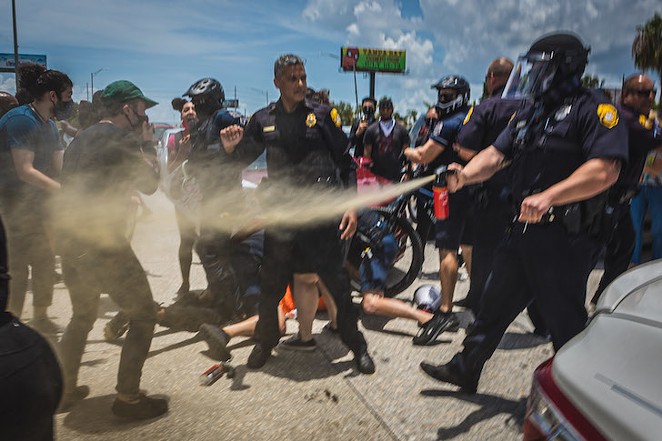
But in Tampa, BLM activist cries for justice were often met with aggression and dismissal. Meanwhile, the city continues to welcome protests against the Cuban government with open arms.
The ACLU of Florida says this behavior might unevenly impact certain people’s freedom of speech.
“The First Amendment cannot be arbitrarily enforced, and yet it seems this was the case with many of the protests that occurred last week across the state including Tampa,” Jennifer Garrett, Media Strategist for the ACLU wrote in an email to CL. “Masses of people took to the streets to demonstrate their solidarity for the Cuban people, much like Black and brown protestors did last summer for their demands for racial justice. Floridians’ right to protest should not be subject to the wavering politics or political preferences of our elected officials."
Support local journalism in these crazy days. Our small but mighty team works tirelessly to bring you news on how coronavirus is affecting Tampa and surrounding areas. Please consider making a one-time or monthly donation to help support our staff. Every little bit helps.
Subscribe to our newsletter and follow @cl_tampabay on Twitter.

